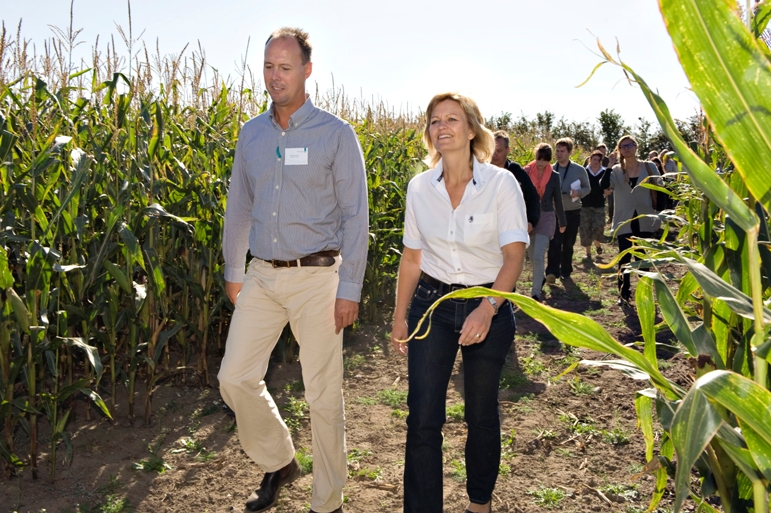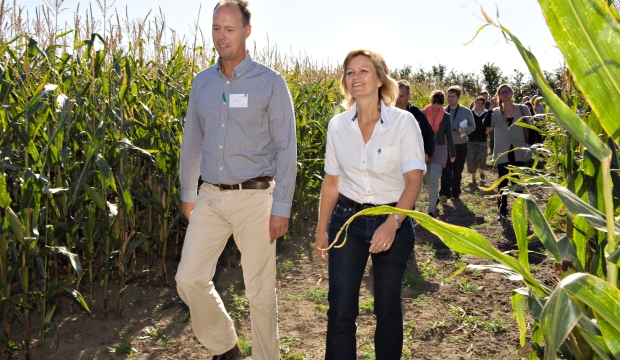The Danish Ombudsman supports Monsantos wish for hiding failed cultivation test with Roundup on genetically modified corn. This decision is criticized by Oluf Jørgensen, Danish expert in Freedom of Information.

The former minister of agriculture Eva Kjer Hansen (V) together with Gerhard Deneken, leader of the state trial farm in Tystofte showing the test fields for GMO corn in 2009. Foto: Danish Ministry of Agriculture.
 The Danish Ombudsman, Jørgen Steen Sørensen, declares his support for the confidentiality of test results for experimental cultivation of Monsanto’s genetically modified corn.
The Danish Ombudsman, Jørgen Steen Sørensen, declares his support for the confidentiality of test results for experimental cultivation of Monsanto’s genetically modified corn.
The Ombudsman has ruled on the matter, after Åbenhedstinget July 2013 raised the refusal of access to test results on cultivation of genetically modified corn developed to withstand Roundup.
Ombudsman based his decision on two key issues
Two EU directives oppose each other in this case, namely the Directive on transparency of environmental information to the confidentiality provisions of the Directive on common catalogue of varieties of agricultural plant species.
According to the Ombudsman it is not clear how the two directives must be weighed against each other. He then concludes confidentiality must be predominant in this case.
He doesn’t evaluate the evidence for the claim from Monsanto’s attorney that the disclosure of the test results would cause a loss for the company. If the test varieties were approved, the results would be published despite the wish for confidentiality.
By claiming confidentiality before the trial and then cancel the test during the planned test period, Monsanto has until now avoided publishing the results.
GM Corn only yielded 97 pct. despite use of Roundup
The test growth of GMO corn was done in 2009 and 2010.
After this warning Monsanto pulled further testing.Investigating Reporting Denmark wrote in May 2013 on the silenced testresults and how Monsanto has stopped it’s activities on GMO in most of Europe: GMO lose Europe – victory for environmental organisations
Monsanto will publish results later, says the company
Investigative Reporting Denmark has asked Monsanto, if the company will publish the results now.
 “The results will be published in a scientific journal in due course,” replies Brandon Mitchener, Public Affairs Lead for Monsanto in Europe and Middle East.
“The results will be published in a scientific journal in due course,” replies Brandon Mitchener, Public Affairs Lead for Monsanto in Europe and Middle East.
He has refused to reply on these follow-up questions:
When will that happen?
Why will you not accept the data to be shared with the public?
How can you have an economic issue wanting to keep it secret in the Danish case and then later publish it in a scientific journal?
Oluf Jørgensen critizises the conclusion from the Ombudsmand

Investigative Reporting Denmark has submitted the documents in the case for a specialist in media law, Oluf Jørgensen. He is head of Research at the Danish School of Media and Journalism. He is very critical towards the Ombudsman’s conclusion.
“The Aarhus Convention and EU Environmental Information Directive is clear. Commercial considerations do not trump the public right to inspect the emission data. The Ombudsman unfortunately overlooked this in his conclusion of Monsanto trial of genetical modified varieties,” states Oluf Jørgensen and continues:
“The key factor in this study was to get an environmental evaluation of the use of Roundup compared to traditional herbicides in the cultivation of the GM variety. Information on contamination of soil and water is clearly emission information. The public is entitled to insight regardless of commercial interests. There is no exceptions for trials.”
“The statement that the test results will be published in a scientific article can not be taken seriously, when the public is denied access to the basic information. It is a defining characteristic of science that documentation can be controlled by others.”
Ombudsman Jørgen Steen Sørensen do not want to comment on the critic from Oluf Jørgensen.
